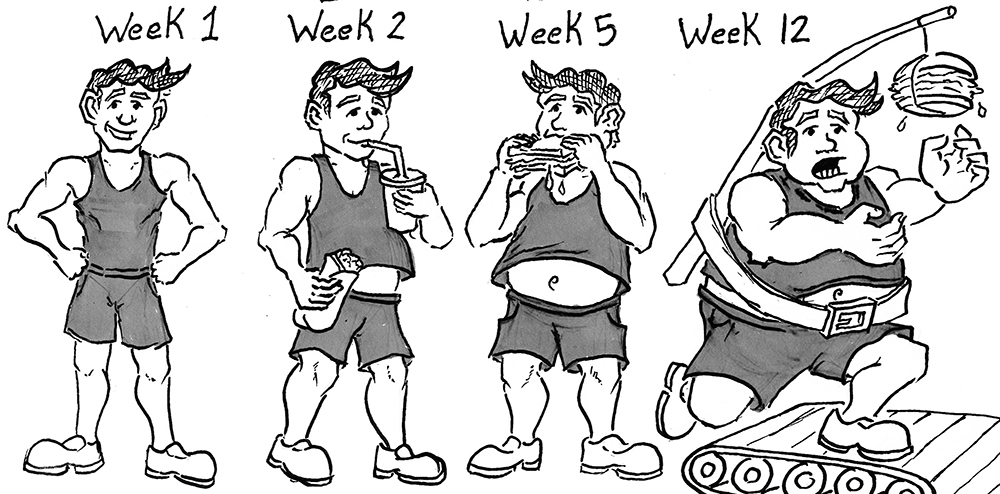Matt Dionne | Sports and Health Editor
Featured illustration: Avoiding the freshmen 15 takes discipline, but it’s not as hard as it might seem. | Christopher Lai
Thanksgiving, colloquially known as Turkey Day, is usually the first time students who have gone away for university return home to see their families.
Maybe you’re returning home with some new facial hair, or a new haircut, or perhaps there is more of you returning home than when you left.
Parents are usually the first to point out how different you look when you come home having packed on a few pounds.
According the University of Windsor, the average student will gain three to 10 pounds during their first two years in university. The majority of this occurs during the first semester of their first year.
One of the reasons for the weight gain is because university life is an adjustment for many people. You have a lot more freedom and choices to make than you did in high school, including what you eat and how much of it. There’s no one to say no to you if you want to have ice cream for dinner or pizza for breakfast.
Students who move away from home have the added responsibility of feeding themselves, as their parents usually aren’t there to cook meals for them. Fast food can become an easier alternative to cooking.
There’s a reason breakfast is called the most important meal of the day. Eating a nutritious breakfast is more filling than eating the same amount of calories later in the day, according to a study by the American Society of Nutritional Sciences’ Journal of Nutrition.
Eating larger meals earlier in the day is better than eating them later because your body uses those calories over the course of the day. Large portions consumed later on in the day have less time to be digested.
People struggle with maintaining their weight during university due to an increase in stress, which can cause people to overeat or indulge in high-calorie foods to cope with their feelings.
Another way to avoid packing on excess weight is to snack throughout the day. This may seem counterproductive, but snacking on healthy foods such as fruits and vegetables improves your metabolism and helps you avoid overeating at meals.
Students often claim they are extremely pressed for time, and even people who are good at time management often have to cut things out of their schedule. For many, regular physical activity is the first thing to go.
You can see it every year at Tait McKenzie: in the first few weeks of school, the gym is packed with sweaty, determined froshies and seniors alike, but as the assignments begin to pile on, the gym becomes less and less crowded, and by the time the calendar gets to the beginning of December, the gym feels like a ghost town.
The amount of calories in your drinks is another, often overlooked, factor in gaining weight. Drinking water is best, but other drinks like green tea, low-fat milk and low-sodium vegetable juice are also healthy. When it comes to fruit juice, avoid drinks with added sugars and artificial flavours, as they often have more calories.
Alcohol is another way to pack on the pounds, as beer, which is essentially liquid bread, is full of calories. A single beer can have anywhere from 50 to 330 calories.
A Toonie-Tuesday after Turkey Day might seem like a good decision, but a healthy diet and physical activity will serve you better in the long run.


